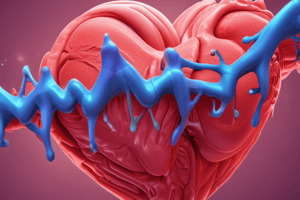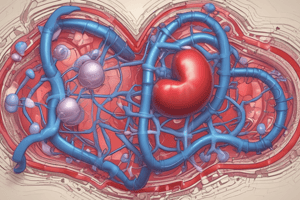Podcast
Questions and Answers
Digoxin is a type of ______ glycoside.
Digoxin is a type of ______ glycoside.
cardiac
The mechanism of action of Digoxin involves inhibiting the activity of the myocardial ______ ATPase enzyme.
The mechanism of action of Digoxin involves inhibiting the activity of the myocardial ______ ATPase enzyme.
Na+/K+
Digoxin increases the ______ fraction, which is the volume ejected with each contraction of the heart.
Digoxin increases the ______ fraction, which is the volume ejected with each contraction of the heart.
LV's ejection
Digoxin treats atrial fibrillation (AFib) by increasing the ______ node's effective refractory period.
Digoxin treats atrial fibrillation (AFib) by increasing the ______ node's effective refractory period.
Digoxin is a ______ that increases myocardial efficiency and improves its contractions, leading to improved blood flow.
Digoxin is a ______ that increases myocardial efficiency and improves its contractions, leading to improved blood flow.
Digoxin is a type of cardiac ______ that increases myocardial efficiency and improves its contractions, leading to improved blood flow.
Digoxin is a type of cardiac ______ that increases myocardial efficiency and improves its contractions, leading to improved blood flow.
Treats HF by increasing the ______ 's ejection fraction, which is the volume ejected with each contraction.
Treats HF by increasing the ______ 's ejection fraction, which is the volume ejected with each contraction.
Digoxin treats HF by increasing the force and velocity of ______ contractions, and decreasing the conduction rate.
Digoxin treats HF by increasing the force and velocity of ______ contractions, and decreasing the conduction rate.
Digoxin does this by inhibiting the activity of the ______ Na+/K+ ATPase enzyme, which controls the movement of ions into the heart.
Digoxin does this by inhibiting the activity of the ______ Na+/K+ ATPase enzyme, which controls the movement of ions into the heart.
Treats AFib by decreasing the ______ rate and increasing the AV node's effective refractory period.
Treats AFib by decreasing the ______ rate and increasing the AV node's effective refractory period.
Study Notes
Digoxin
- A cardiac glycoside, antiarrhythmic, and cardiotonic medication
- Increases myocardial efficiency and improves contractions, resulting in enhanced blood flow
Mechanism of Action (MOA)
- Inhibits myocardial Na+/K+ ATPase enzyme (sodium pump), controlling ion movement in the heart
- Increases left ventricle's ejection fraction, strengthening heart contractions
- Boosts the force and velocity of myocardial contractions
- Decreases the conduction rate
Treatment of Atrial Fibrillation (AFib)
- Decreases conduction rate
- Increases the AV node's effective refractory period, preventing rapid cell responses to new stimuli
Digoxin
- A cardiac glycoside, antiarrhythmic, and cardiotonic medication
- Increases myocardial efficiency and improves contractions, resulting in enhanced blood flow
Mechanism of Action (MOA)
- Inhibits myocardial Na+/K+ ATPase enzyme (sodium pump), controlling ion movement in the heart
- Increases left ventricle's ejection fraction, strengthening heart contractions
- Boosts the force and velocity of myocardial contractions
- Decreases the conduction rate
Treatment of Atrial Fibrillation (AFib)
- Decreases conduction rate
- Increases the AV node's effective refractory period, preventing rapid cell responses to new stimuli
Studying That Suits You
Use AI to generate personalized quizzes and flashcards to suit your learning preferences.
Description
Learn about the mechanism of action of digoxin, a cardiac glycoside and antiarrhythmic, used to treat heart failure. Understand its effects on myocardial contractions and sodium pump inhibition.




